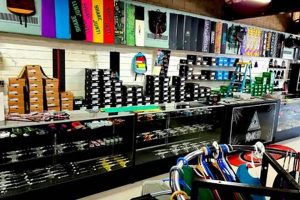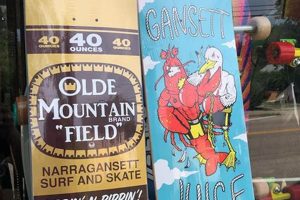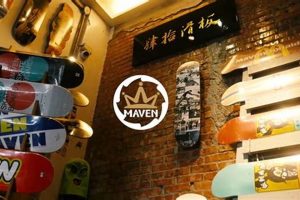An establishment specializing in skateboarding equipment, apparel, and related services forms the core of this analysis. It provides goods ranging from skateboards and protective gear to clothing and accessories catering to skateboarders of all skill levels. Services offered can include board customization, repair, and advice on selecting the appropriate gear.
Such a business contributes to the local skateboarding community by providing essential resources and fostering a sense of belonging. Historically, these establishments have played a crucial role in the growth and development of skateboarding culture, acting as hubs for skaters to connect, learn, and share their passion. They offer expertise and support that larger retailers often lack, enhancing the skateboarding experience for individuals and the broader community. These places also introduce newcomers to the skateboarding world.
The following sections will delve into specific aspects of this type of retail operation, exploring its role in supporting local skateboarding scenes, the range of products and services typically offered, and the challenges and opportunities it faces in a competitive market.
Skateboarding Best Practices
The following guidelines aim to enhance the skateboarding experience through proper equipment selection, maintenance, and safety precautions.
Tip 1: Equipment Assessment: Regularly inspect skateboard components, including the deck, trucks, wheels, and bearings. Address any signs of wear or damage promptly to ensure optimal performance and safety.
Tip 2: Protective Gear Utilization: Helmets, knee pads, elbow pads, and wrist guards are essential for injury prevention. Consistent use of appropriate protective gear significantly reduces the risk of skateboarding-related injuries.
Tip 3: Surface Evaluation: Before initiating any skateboarding activity, assess the suitability of the riding surface. Avoid areas with excessive debris, cracks, or other hazards that could compromise control and stability.
Tip 4: Skill Progression: Advance to more challenging tricks and maneuvers gradually. Mastering fundamental skills before attempting complex techniques is crucial for minimizing the likelihood of accidents.
Tip 5: Consistent Maintenance: Clean bearings regularly to remove dirt and debris, ensuring smooth wheel rotation. Lubricate bearings as needed to maintain optimal performance and extend their lifespan.
Tip 6: Appropriate Footwear: Wear skateboarding-specific shoes designed for grip and board feel. Proper footwear provides enhanced control and reduces the risk of slippage during maneuvers.
Tip 7: Community Engagement: Seek guidance and advice from experienced skateboarders within the local skateboarding community. Learning from others can accelerate skill development and promote safe practices.
Adherence to these best practices contributes to a safer and more enjoyable skateboarding experience, fostering skill development and minimizing the risk of injury.
The article will now proceed to examine related topics such as advanced skateboarding techniques and the evolution of skateboarding equipment.
1. Equipment Selection
The availability and suitability of skateboarding equipment are fundamentally linked to the role and success of establishments like this retail operation. Selection directly impacts a skater’s safety, performance, and overall experience.
- Deck Variety and Customization
The shop offers a wide range of deck sizes, shapes, and materials, catering to various skating styles and preferences. Customization options, such as grip tape application and graphic design, allow skaters to personalize their boards, fostering a sense of ownership and connection. This selection process allows for fine tuning the boards for skater.
- Truck and Wheel Specialization
The business provides a selection of trucks and wheels designed for different terrains and riding styles. Truck options include varying axle widths and heights to accommodate different deck sizes and wheel preferences. Wheel choices encompass a range of durometers (hardness) and sizes, enabling skaters to optimize their setup for street, park, or vert skating. Specialization gives options for all kinds of terrains.
- Protective Gear Accessibility
A critical aspect of equipment selection is the availability of high-quality protective gear. Helmets, knee pads, elbow pads, and wrist guards are essential for minimizing the risk of injury. The shop ensures that skaters have access to a range of sizes and styles of protective gear, promoting safe skating practices and injury prevention.
- Hardware and Component Quality
The provision of quality hardware, including bearings, bolts, and bushings, is vital for ensuring the smooth operation and longevity of skateboards. The shop stocks reliable components from reputable brands, providing skaters with confidence in the performance and durability of their equipment. Proper Hardware makes any board last long.
These facets of equipment selection collectively contribute to the overall value proposition. They provide a platform for skaters to acquire the necessary tools for safe, enjoyable, and progressive skateboarding experiences.
2. Community Hub
The skate shop, in its capacity as a community hub, fosters interaction and support among skateboarders of varying skill levels. These establishments often serve as meeting points where individuals can share experiences, learn from one another, and build relationships centered around their shared passion for skateboarding. The physical space provides a neutral and accessible location, encouraging both experienced skaters and newcomers to connect and engage in discussions related to equipment, techniques, and local skating spots. The availability of a physical hub strengthens the social fabric of the skateboarding community.
The presence of experienced staff within the skate shop environment contributes significantly to its role as a community resource. Employees, who are often skateboarders themselves, can offer guidance, advice, and mentorship to less experienced individuals. This transfer of knowledge not only enhances skill development but also promotes a sense of camaraderie and mutual support within the community. Events and workshops hosted at the shop can further solidify its function as a community hub, providing structured opportunities for skaters to learn new tricks, participate in competitions, and showcase their abilities. For example, many skate shops sponsor local skate teams, further cementing their role within the community.
The relationship between the skate shop and the community it serves is symbiotic. The community provides the shop with a customer base and a source of engagement, while the shop, in turn, offers essential resources and a gathering place that fosters a sense of belonging. This reciprocal relationship is vital for the sustainability of both the skate shop and the broader skateboarding community. Overcoming challenges such as online competition and fluctuating economic conditions often relies on the skate shop’s ability to maintain and strengthen its position as a central point of connection within the local skateboarding scene. This position is essential for the long-term viability of the store.
3. Expert Advice
The provision of informed guidance represents a critical function, enhancing customer experience and promoting responsible skateboarding practices. The availability of qualified personnel capable of offering technical knowledge and practical recommendations is central to the success of any retail operation serving the skateboarding community.
- Equipment Suitability Assessment
Expert personnel can assess a customer’s skill level, riding style, and intended usage to recommend the most appropriate skateboard components, including decks, trucks, wheels, and bearings. This ensures the skater acquires equipment that aligns with their needs and abilities, preventing the purchase of unsuitable or potentially dangerous gear. For example, they might suggest a softer wheel durometer for a beginner focusing on street skating or a wider deck for someone transitioning from park to vert.
- Troubleshooting and Maintenance Guidance
Experienced staff can diagnose common skateboard issues, such as bearing wear, truck looseness, or deck damage, and provide guidance on maintenance procedures and repair solutions. This knowledge empowers skaters to maintain their equipment properly, extending its lifespan and ensuring safe operation. This includes advice on lubrication, tightening bolts, or identifying when components need replacement.
- Skill Development Recommendations
Advisors can offer insights into skill progression, suggesting appropriate learning resources, techniques, and practice routines. This support can accelerate a skater’s skill development and prevent frustration or discouragement. For example, suggesting drills for improving balance or recommending specific tutorials for learning new tricks. They might also direct customers to local skate parks or instructors.
- Safety and Injury Prevention Education
Knowledgeable employees can educate customers on the importance of protective gear and safe skateboarding practices. This includes advising on the proper fit and usage of helmets, knee pads, elbow pads, and wrist guards, as well as promoting awareness of potential hazards and responsible riding etiquette. This also involves reinforcing the importance of skating within one’s abilities and gradually progressing to more challenging maneuvers.
The availability of expert advice solidifies its position as a trusted resource within the skateboarding community. It fosters customer loyalty, enhances the shopping experience, and contributes to the overall safety and enjoyment of skateboarding.
4. Repair Services
The provision of repair services is a critical aspect of operation, extending the lifespan of skateboarding equipment and offering a valuable resource to its clientele. These services contribute significantly to customer satisfaction and reinforce a commitment to supporting the skateboarding community.
- Deck Repair and Restoration
Decks are susceptible to damage from impact, stress, and environmental factors. Repair services address issues such as cracks, delamination, and water damage. Techniques employed may include gluing, clamping, and reinforcing damaged areas. Restoring a deck’s structural integrity extends its usability and prevents premature replacement, resulting in cost savings for the skater. Many establishments use epoxy resins for crack repairs.
- Truck Maintenance and Refurbishment
Trucks endure significant stress and are prone to wear and tear. Repair services encompass cleaning, lubricating, and replacing worn bushings, pivot cups, and kingpins. Damaged trucks can be straightened or have bent axles replaced. Regular maintenance ensures proper truck function, contributing to board stability and control. Corrosion removal is a common refurbishment task.
- Wheel and Bearing Service
Wheels and bearings are essential for smooth rolling performance. Repair services include cleaning and lubricating bearings to remove dirt and debris, as well as replacing damaged or worn wheels. Proper bearing maintenance enhances speed and reduces friction. Specialized tools are often required for bearing removal and installation. Some establishments offer bearing cleaning kits for customer use.
- Hardware Replacement and Adjustment
Loose or damaged hardware, such as bolts and nuts, can compromise the safety and performance of a skateboard. Repair services involve replacing missing or stripped hardware and ensuring proper tightness. Adjustment of truck tightness affects turning responsiveness. Utilizing appropriate tools, such as skate tools, is crucial for secure hardware installation. Replacement hardware often includes upgraded materials for enhanced durability.
These interconnected repair services directly enhance the user experience by ensuring reliable and well-maintained skateboarding equipment. Offering such services positions the establishment as a comprehensive resource within the skateboarding community, fostering customer loyalty and promoting sustainable practices.
5. Local Culture
The presence of a skateboard shop, as a retail outlet, is inextricably linked to the culture of its surrounding locale. The shop’s stock, aesthetic, and activities invariably reflect the values, preferences, and demographics of the local skateboarding community. Conversely, it actively shapes this culture by providing resources, fostering connections, and propagating specific trends or styles. This mutual influence creates a dynamic ecosystem in which the business and the community continually reinforce and redefine one another. As an example, a shop located near a predominantly street-skating park might stock more street-oriented boards and apparel, sponsor local street contests, and cultivate a gritty, urban aesthetic. This, in turn, solidifies street skating as a dominant aspect of the local scene.
The impact of the retail presence on the community extends beyond mere product selection. It serves as a physical embodiment of the local skate scene, acting as a gathering place, information hub, and source of identity. The shop may host events such as skate film screenings, art shows featuring local artists, or workshops focused on skateboarding skills and techniques. These activities not only provide entertainment and educational opportunities but also strengthen the bonds between skaters and promote a sense of shared identity. In some cases, shops collaborate with local artists to create limited-edition products or artwork, further integrating themselves into the cultural fabric of the area. This type of collaboration also drives local talent.
Understanding this interplay between the retail operation and the culture of the locale is crucial for its long-term success. By carefully observing and responding to the needs and preferences of the local skateboarding community, it can cultivate a loyal customer base and establish itself as an integral part of the scene. Challenges arise when failing to adapt to changing trends or when neglecting the unique cultural nuances of the surrounding area. A thorough understanding of the local scene, including its history, demographics, and dominant styles, is essential for navigating these challenges and ensuring its relevance and sustainability within the broader skateboarding landscape. Ignoring the local cultural signals leads to the loss of business.
Frequently Asked Questions
The following section addresses common inquiries regarding the nature, function, and operations.
Question 1: What specific types of skateboarding equipment are offered?
The selection encompasses complete skateboards, decks, trucks, wheels, bearings, hardware, and protective gear, catering to diverse skateboarding styles and skill levels. Emphasis is placed on providing high-quality components from reputable manufacturers.
Question 2: Are repair services available for damaged skateboards?
Yes, repair services constitute a significant aspect. These services include deck repair, truck maintenance, wheel and bearing cleaning/replacement, and hardware adjustments. The aim is to extend the lifespan of skateboarding equipment and provide a cost-effective solution for skaters.
Question 3: Does it cater to beginner skateboarders or only experienced riders?
It serves skateboarders of all skill levels. Beginner-friendly complete skateboards and protective gear are available, along with expert advice on selecting appropriate equipment and learning fundamental skateboarding techniques.
Question 4: What measures are in place to ensure the safety of customers, particularly regarding protective gear?
Promoting safe skateboarding practices is paramount. Knowledgeable staff provide guidance on selecting and properly utilizing protective gear, including helmets, knee pads, elbow pads, and wrist guards. Emphasis is placed on the importance of responsible riding habits and skill progression.
Question 5: How does this business contribute to the local skateboarding community?
It functions as a community hub, fostering connections and shared experiences among skateboarders. Activities such as skate film screenings, workshops, and sponsored events are often organized to engage the local skateboarding scene and promote a sense of belonging.
Question 6: What factors differentiate from other skateboarding retailers, particularly online stores?
Differentiation stems from the provision of expert advice, personalized service, and a community-oriented environment. Unlike online retailers, it offers a physical space for skaters to connect, receive hands-on guidance, and access specialized repair services. Emphasis is placed on building relationships and fostering a sense of loyalty within the local skateboarding community.
These answers provide an overview. Understanding the offerings of a business greatly benefits new clients and the community.
The following sections will explore alternative skateboarding retail models and analyze the challenges and opportunities facing this type of business in a rapidly evolving market.
Conclusion
This analysis has explored the multifaceted role of a siren skate shop, emphasizing its significance as more than a mere retail outlet. From equipment provision and repair services to community building and expert guidance, this type of establishment serves as a vital resource within the skateboarding ecosystem. Its success hinges on understanding and catering to the specific needs and cultural nuances of the local skateboarding community.
Continued evolution and adaptation are essential for ensuring its relevance in a changing market landscape. By prioritizing customer service, fostering community engagement, and offering specialized expertise, such an establishment can solidify its position as a cornerstone of the local skateboarding scene, contributing to the growth and vibrancy of the sport for years to come. Supporting local skate shops sustains the skateboarding community.







